Video of the Fireside Chat - Episode 4 with Mike Branch
Transcript of the Conversation:
Piyush Malik: The Digital Agenda. Is all about data analytics, cloud, ai/ ml, and emerging technologies that are transforming not only companies, but also entire industries and even our lives. Hi, my name is Piyush Malik, a curious mind who wears multiple hats as an engineer, a management consultant, practitioner, a builder, a thought leader, entrepreneur, and a C-suite
Piyush Malik: I have been in the industry helping organizations realize and navigate the value of data analytics, applied ai, ml and emerging technologies. I have created strategies and transformation programs that helps them compete [00:01:00] with the digital native.
Piyush Malik: In today's episode 4 of The Digital Agenda, we'll be talking with Mike Branch, who's been my client from Canada. He joined, Geotab in 2016, where he brought in two decades of experience and accomplishments as a data scientist, software developer, engineer, and an entrepreneur. In his current role as Vice President of Data and Analytics, he leads the development of data products and data strategy.
In 2021, Mike played a key role in the development of Geotab intelligent transportation system, which provides insights to develop more efficient, safer, and sustainable transportation systems. I had the privilege of working with Mike in 2017 in 2018 timeframe when we were introducing them to. Google Cloud ai, ml and advanced analytics through BigQuery.
And prior to Geotab, Mike was the founder and CEO of Innovax, -a software development company focused on servicing the healthcare industry and municipalities over these years. Mike has received numerous awards for professional leadership, volunteerism, and product innovation. He holds a BSE in computer science from the University of Toronto and a Master's of Management in AI from Queens University, and he's a licensed professional engineer. Without much further ado, let's go and meet Mike.
Piyush Malik: Hello everyone. Welcome to the digital agenda episode 4 . Today our special guest is Mike Branch. He is the Vice President at Geotab. It's a Canadian company and I would let Mike introduce himself. So Mike, welcome and please tell about yourself. [00:03:00]
Mike Branch: Yeah. Thanks so much, Piyush. As you mentioned, from a Canadian company here called Geotab.
Mike Branch: We we connect to millions of vehicles across the globe. So we're connected to about three and a half million commercial vehicles. And you know, I, started with the company about seven years ago now. By trade, ie by education. I'm a, I'm an engineer- a computer engineer, graduating from the University of Toronto in computer engineering.
Mike Branch: And after that way back in, you know, 2003 that is now and, and I I started up a company, a soft small software company called Inex with my lab mate at the time, actually at, at U of T. And we ran that for about 13 years. And we did a lot of Development custom software development for the sector.
Mike Branch: You'd find us on oil and gas rigs in Calgary, Alberta [00:04:00] developing real-time data acquisition systems for for those rigs. And, and so a whole bunch of software development work and. And what we kind of find found ourselves good at was visualizing data and, and making sense of that didn't really matter what the industry was.
Mike Branch: So we we spun up a new kind of entity, which was related to visualization with a geospatial twist on it called Maps bi. And after a few years of running that my, my marketing manager at the time Chris he, he actually ended up playing squash with Neil, who was the CEO of Geotab.
Mike Branch: And he said, you know what I think, I think I should meet because. You know, you guys are doing some really interesting things when it comes to, to data and to visualization with this geospatial context. And Neil's got this telematics company I knew nothing about telematics at, at the time. [00:05:00] And so we end up becoming a partner and kind of the rest is, is, is history.
Mike Branch: So there's just, you know, one day I got a, a one-liner email from Neil that said, Hey, how'd you like to. To be part of Geotab. So I thought a bit about it and haven't looked back since. It's been phenomenal. I've seen the growth like crazy over the last seven
Piyush Malik: years. Awesome. This is a, this is a very wonderful story to dive deeper into different aspect of it.
Piyush Malik: So, engineer at heart, born in Canada. And while playing sports, you make connections. And, that's, that's how you land your next big gig. So more importantly, you're an entrepreneur at heart. You have started companies and you have led the growth that I have seen from the association you and I had.
Piyush Malik: While at Geotab Google Project, you've grown. Company, your, your division [00:06:00] within, within the company, within such a caring manner that everybody loves working with you. So definitely hats off to your management capabilities, but also the data and analytics geek in you who continue, go deeper into it from visualization to and spanning industries.
Piyush Malik: Telematics on with sensor data on oil rigs, and now with automotive. It's,a very amazing story. Very fascinating. So let's dive deeper into your journey from, from pure data analytics into data analytics on the cloud, and how ai driven projects that you started leading.
Mike Branch: Yeah. No, absolutely.
Mike Branch: It's a g Great question. I haven't thought about that one in a while. So my journey when it came to data was really came from, I came in it from a software perspective. I always liked writing software and to write software, any software, especially early [00:07:00] days, there's always some sort of data. There has to be a data element to it.
Mike Branch: And so started off very early, you know, with MySQL and SQL L server. Back in the day when, you know you'd have your, your dot net application with an SQL server backend on the, on the computer itself, right? Maybe you have an SQL L light database. And, and so that's kind of where my kind of interest in, in data started from, was really from that kind of software angle.
Mike Branch: And then you know, as the cloud came to be in its own right, right in the you know, two thousands and, you know, 2010 and 2012, and, and it, it really morphed what you could do with data at scale was rapidly changing. And so when we first designed our, our maps BI platform, which is kind of like Tableau, but it was very geospatial oriented.
Mike Branch: They're. Doing data at scale wasn't quite a thing [00:08:00] yet, right? You, we were still reliant on a lot of older R D B M S systems like SQL L server. And so getting them to be really performant was quite a challenge, a lot of query optimization. One of the things that I really liked was, I love geospatial data.
Mike Branch: I think just had always had a fascination with it. And, and to do things at scale with geospatial data can become, you know, quite complex. So that's kinda where my journey began with, with data was really from the, the databases side of things. I, I didn't have formal education, you know, and analytics and all this kind until later actually in life.
Mike Branch: I, I went back for a master's in management in ai. Oh, okay. And I did that at, at Queens University while I was with Geotab. And, and learned a heck of a lot there as well too. What a, what a great program that was. But it was really with, with Geotab that I could kind of parlay that knowledge of SQL l of database systems into this kind of new, new world.
Mike Branch: And I always had that kind of entrepreneurial [00:09:00] background, so could kind of marry the two the two together. And, and so with the introduction of things like Google Big Query. The interesting thing about that was that you could take your skillset from these relational databases and immediately be impactful at scale.
Mike Branch: And for me that was the really cool thing because half the battle, not to say that you don't have to worry about query optimization cuz you do, but half the battle when you're dealing with these smaller systems, if you want to build them to scale, what a challenge that that really becomes. And with, with systems like Google, BigQuery, like Snowflake, like these.
Mike Branch: You know massive, massive systems, it becomes a heck of a lot easier. And to do that with geospatial data, like wow, you could write queries that would, you know, process millions, billions of records of data you know, in seconds. And, and do all sorts of really interesting things and geospatial data.
Mike Branch: It's not easy to do that at, at scale. So [00:10:00] and then from there, you know there's been so much that you know, we've learned it's the, the world has changed so much from a mm-hmm. A Dana's perspective from the time I started at Geotab in 2016 to now the tool sets that you have to work with it's constantly changing.
Mike Branch: You have to be, you know I think consistently learning as, as you go in this.
Piyush Malik: Yeah. And you've been a consistent learner, a continuous learner. I mean, you talked about your master's that you just completed. And again learning on the job, while on the job, as well as augmenting it with, with the university program definitely enriches your professional life.
Piyush Malik: And now talking about, you know, the way, you were talking about how when Cloud came and and you were able to apply your R D P M S knowledge, The cloud it seems like you felt like a kid in a candy store when the cloud came, and then you were able to play with all kind of data, right? Yeah. So, yeah.
Mike Branch: Yeah. [00:11:00] And, and I think, I mean, it's, it's interesting. It's fascination. I think, you know, when you first start, when we first started at Geotab was a lot of exploration, right? Mm-hmm. Because the way we used something like Google BigQuery at first was very much It wasn't part of our production systems, right?
Mike Branch: It was used for a lot of diagnostics and early analytics, but we said, you know what? Let's just pump everything to the cloud, right? And then we, we have this repository where we can use it to help support our customers provide better systems, that kind of thing. And then you quickly realize that if you're not careful, you can create, you know, this kind of data swamp, right?
Mike Branch: This, this dumping ground Yeah. Of data. And as it, as fun as it is to experiment with the data and to, you know, develop new models and this kind of thing there's a, there's a huge. Tax to be had if you don't focus on, on data quality, right? And making sure that the quality of the data that goes into [00:12:00] all the modeling that you're doing that that's well governed, well executed.
Mike Branch: And we went through several learnings of that, right? Especially your early days when these systems were relatively new, especially to do at scale. Better you know, data governance practices, data lineage, data providence, metadata management. All are, you have to treat data as a product and, you know, yeah.
Mike Branch: I've talked about that quite a few times and that's my, I think my biggest piece of advice to, to people jumping into it from the start is yes, experiment, but realize that if you're gonna take data to this production, great, you have to treat it as a product. And there's so many things that make that different from a traditional kind of software development process.
Piyush Malik: Yeah, absolutely. And, and let's, let's give the audience some degree of scale when, when we were working on that project Yeah. To classify the vehicles through the usage of looking at the data and through the telemetric data and all that. [00:13:00] You know, you were running more than almost 1.5 million vehicles the records and, and it was in petabytes per day.
Piyush Malik: Where has it gone from there to now?
Mike Branch: Yeah, so when we worked together with you folks at at spring and Google there we were about one and a half million and probably the size of my team at that point in time. Would've been maybe around 30 or so people. So since then, we've grown to three and a half million commercial vehicles, 55 billion data points every single day.
Mike Branch: Wow. And we're at about 120 people in our, in our core kind of data and analytics team.
Piyush Malik: Beautiful. Beautiful. So definitely almost from 3 billion records process per day to 50. Billion this is, this is definitely a mega scale. So did you end up using any special [00:14:00] kind of processors within Google, G C P, or you are using the normal normal.
Piyush Malik: Did you use GPUs or did you use GPUs?
Mike Branch: Yeah. We use GPUs in, in certain instances, depends on kind of what we're, what we're doing, what we're processing. There's so many. We have data scientists with a number of different skills looking at a wide range of different problems, right? Ranging from simple linear regression problems all the way through to more complex computer vision problems as well too.
Mike Branch: So it does depend on the task at hand, and we're able to kind of tweak that as, as needed. You know, I think it, our, our first actually foray into, into machine learning. You were, you guys were very much. Very close to the beginning of that with us, right. And we, as we were, as we were learning as this stuff was, was, was relatively new.
Mike Branch: And, and we've kind of taken that and built [00:15:00] upon that. It was, it was cool. So for, I mean, for everybody's understanding, what we were trying to do and what we've evolved since that time as well too, is understanding the movement of a vehicle. Right? Yeah. And when people are trying to when our fleets, our customers are customers like, you know ups, PepsiCo, some of the largest kind of fleets in the world and when they're trying to You know, create a more efficient, more productive program for their fleets.
Mike Branch: Oftentimes you can compare against yourself, but you don't really know what, what good looks like, right? So we have the advantage now of having, you know, three and a half million connected vehicles we can benchmark quite easily. But if you benchmark, you have to benchmark against. Apples to apples, right?
Mike Branch: If you think about fleets, they can be fleets of construction vehicles, of delivery vehicles, municipal vehicles. You can have lawnmowers, you can, so there's, there's so many different kinds of, of what we call vocations of vehicles and mm-hmm. So what was important for us at this [00:16:00] exercise that we started with, with you guys was.
Mike Branch: Understanding, you know and being able to classify the vocation of a vehicle. Are you a long haul freight type vehicle? Are you a hub and spoke delivery vehicle? And since then, we've evolved those. And now, now you can now once you can benchmark.
Mike Branch: Which I think is, is really powerful.
Piyush Malik: Yeah. Great. And now with your platform, you are able to offer those insights to your end customers as well. Talk about that and how that platform has evolved over the last couple of years.
Mike Branch: Yeah, and, and so the way I like to look at these things are, is really these active insights, right?
Mike Branch: So it's being able to. To not just show charts and, you know, graphs and everything on, on a page, just being able to tell you what you need to look at. You know, right now, and the way that we kind of look at it is our, our engine itself. The we call it my Geotab, that's our piece of [00:17:00] software that, you know, that is our fleet management software.
Mike Branch: You can create all these amazing rules, right? So if you want to create a rule that whenever your vehicle enters a specific geographic bounds and you know, you're in the park position, you want to, I dunno, send. A notification to open up a garage or something. You can do that via these APIs, right?
Mike Branch: Create these complex rules. Now with the insights from the vehicle, what we're able to do is instead of that insight coming from the vehicle, like a, a parking a shift in parking or windshield wiper activation, we have our models that come from the vehicle. So it's like, Hey, we think that you've got electrical systems.
Mike Branch: Or hey, we think that you're, you've got a coolant issue. Or, Hey, we think that these, you know three drivers, something's going on with the way that they're driving, they're driving abnormally. You may want to consider an intervention [00:18:00] here from a safety perspective, right? So the platform is is shifted.
Mike Branch: M much more to an insights driven platform. Very much. I, I, I was pictured like an AI enabled fleet manager, right? Mm-hmm. Mm-hmm. That, that can really help guide the guide the fleet.
Piyush Malik: Yeah. Yeah. No this is, this has been a great learning. I mean, I'm observing you and your project from a distance now, ever since we disengaged after the initial couple of projects and now that I'm seeing a lot of news about my Geotab and the growth of the platform, it definitely goes to.
Piyush Malik: Perseverance and, and the ability of your team to pull together things by yourself. So obviously Google Cloud has been instrumental to your technology stack as well. So I wanted understand if you had experimented with any other technology stack as well in a [00:19:00] multi-cloud world, or is it just on one cloud, right?
Mike Branch: We're, I mean, we're predominantly a Google shop and there's there's advantages quite a few advantages of that in terms of a kind of a common framework and common platforms that we're leveraging using. We, we have experimented you know, we have some, some work on a w s, we've got a little bit of work on Azure as well to so but I would say, you know, by and large we are, you know cloud cloud shop, and, and the, the teams love working with that, that technology as well too.
Mike Branch: Yeah. Yeah.
Piyush Malik: And, and Google's recognize you guys as well with, with awards for, for the innovative work that you guys have done. So congratulations on that. And Of course. Oh, thanks, Pash. Yeah. Personally, you have always been a winner. I was reading through some of the pre awards that you won in the past and you know, it, it, it's definitely a mark of.
Piyush Malik: Very strong leader to continue to [00:20:00] work and deepen their work. And so I'm, I'm amazed at how you have, how fast you have scaled your team. This is something which I hear from most of my clients, that they can't find the right talent and even if they have found they can't retain them. They have challenges in doing so.
Piyush Malik: And from a startup perspective, Geotab was virtually a startup when, when you joined them, right? Very small company. And now it's grown and, and your team has grown. So you must be doing something right. So what do you do to keep your team engaged and Motivat.
Mike Branch: It's a great, it's a great question, and, and by by no means are we immune to you know, everything that's happened within the technology sector.
Mike Branch: It is challenging, I think especially, you know, 20 21, 20 20, 20 21 was, was were challenging times for sure for everyone. I mean, some of the [00:21:00] things I think that we do and a big call out to one of my colleagues, I think he put it quite well. You know, people the data scientists, we come, they, they come for the data cuz it's pretty cool data.
Mike Branch: I mean mm-hmm. Three and a half million vehicles, 55 billion data points a day. Really cool data. And they stay for the culture, right? And so one of the things that I, I think drives a lot of the, the folks that we have at Geotab is not only the interest in the kind of data, but then there's a mission-based element to it too, right?
Mike Branch: We we are very focused on, you know, driving reduce re reduction in collisions on the road. There's a huge sustainability play for us as well too, right? We are focused on transportation decarbonization, right? How can we make sure that as we. Evolve. As these vehicles evolve, there's gonna be a transition to electric vehicles that's already happening as we see right across the board, and how can we help our customers transition to electric vehicles?
Mike Branch: And if you're not at the point where you can [00:22:00] transition quite yet, well, let's help you with your idling and reduce your carbon emissions. And, and so at Geotab there's a massive, massive play on, on. Yes, we as an organization can have a huge impact from a sustainability perspective, but the bigger impact we can have is on the connected vehicles that we're already and on the organizations we're working with, you know, the 40,000 plus customers and helping them along their sustainability.
Mike Branch: So that mission-based. Sense, I think gives people a sense of purpose and what they're doing is having an impact. And so the more that we can, we can show that, that that's great. I think, you know, we've, we've had, you know, we've lost people though in the past, right? And I think some of the things that I've learned is as, as the team evolves from, cause we started off as five on the data and analytics, and now we're 120.
Mike Branch: And each step of that evolution. You know, you're the cha the team dynamic changes, right? And how the teams get formed changed. So I [00:23:00] like what we've done more recently. It takes a village to raise any data product and, and making sure that we have kind of smaller squads, right? It's kind of like you're, we're adopted some of the Spotify model, right?
Mike Branch: It's a strong product manager, right? Giving the team a purpose of like, what are we doing? What's the why? I'm communicating with a customer consistently. You have strong product delivery, right? Technical project management. So product manager thinks about the strategy and the t p m thinks about the execution, right?
Mike Branch: So keeps the team on track and then you marry that with a strong. And a data science and software development all kind of in one squad that isn't too big. And we find that that is a, a nice recipe for making sure that, you know, people are engaged that you don't have the technical leaders consistently trying to think about the why behind things.
Mike Branch: It's important for them to be engaged, but. Having a strong product team [00:24:00] has been such a crucial, I think, element to to retention as well, right? Because I think people need to know the why and need to be engaged.
Piyush Malik: Yeah, absolutely love it. Love it. Mission sustainability, safety, and. It's so great that we are talking on the verge of world earth Day this weekend.
Piyush Malik: Yeah. And you're bringing up this point. So this definitely is lot of youngsters are driven towards bigger mission and to keep the culture and the team's cohesive. That's the manager's job, but more than a manager. I think you've. During your hands as well. You've been rolling up sleeves and doing things by yourself as, as an entrepreneur that's in your inherent nature to do things by hand.
Piyush Malik: And when your team sees you do these things together, the team grows together and it's the intellectual growth, the opportunities you offer. [00:25:00] While you, they are on the job and learning on the job and also growing the career. So I think you've got all the elements covered mission, safety, environment, and career growth.
Piyush Malik: So good luck on, on to you on that. And of course all the it's, it doesn't come without hard work. What you see is a smiling face, but I'm sure you would paddle a lot. Behind the scenes, there's a lot of work that goes
Mike Branch: into it. A. Oh, as I'm sure you can attest to as well too. It's a, it's a lot of work.
Mike Branch: I have lost my
Piyush Malik: hair doing that for the last 30 years, so you, you and I haven't had that many meetings in person. But once, once we meet we'll, we'll share more details. That'll be the next session about me. But today it's all about you. So we want to know in almost summarizing the last few minutes here What would be Mike [00:26:00] Branch doing if not for analytics, data and cloud?
Mike Branch: Ah, that's that's a great question. You know and I, I would be doing this, although I probably wouldn't make a career of it. I always loved acting and stage acting as and so I, I grew up doing that kind of on the side. I got involved in some community theater as as, as a youngster growing up.
Mike Branch: I haven't done it in, in, in years now, and there's probably a reason for that. But it's fun. I, I, I enjoy it quite a bit and I think for. What I enjoy most about that is not, yeah, the, the, the performance itself is fun. You get, there's always that, that bit of nerve wracking, but it's the lead up to it all the, the practices and the rehearsals and the fun that you have with you know, your fellow castmates.
Mike Branch: And and again, it's not dissimilar to pro. You're creating a product, right? The product is, The play, there's a, a lot of creativity that goes into it. A [00:27:00] lot of camaraderie, a lot of fun. And, and so, yeah not to say that I'd I'd be on stage at Broadway, but I'd be doing my own thing, having, having fun anyways, if it weren't for right.
Piyush Malik: No, it's always good to have something fun things. So talking about, you know entertainment as a product and now you obviously deal with data product. So what would be your advice to somebody who's getting started on building data products? Let's say they're early in your data engineers, and you and I have hired a lot of data engineers, data architects and, and data scientists.
Piyush Malik: But the still, they, you have to give advice to somebody who's just getting started. So what would.
Mike Branch: Take a product first approach for sure. And I think really adopt the principles of product management to begin with. Because I think if you start there, you're starting with the customer first, right? There's [00:28:00] some great books that, you know, Marty Kegan has written in Silicon Valley, right?
Mike Branch: Inspired and empowered that I think are great reads. If you're not, if, if you're an aspir. Person in the, in the, in the realm of data. I would start with understanding some product management principles, cuz that's gonna allow you to apply that to the data world. Right. And then as you're thinking about, they think about it iteratively, right?
Mike Branch: But make sure. That you've got quality data to, to, to start with, right. I think it can get quite easy. I think one things that we did well is there's a lot of folks, if you look at data engineering and data science, we focused very much on the data science component first to to, to, to productize something quickly, right?
Mike Branch: We, we left a lot of the pipelining and everything like that to to Google at that time. And allowed us to get to market quickly, whereas I had some colleagues who did the reverse. They spent so much time building this massive framework that they couldn't get [00:29:00] anything to market. So I think there's, there's something to be said in iterating and you can continuously iterate, continuously improve your product.
Mike Branch: But, but you do want to get, you know that's where the product management principles, I think really come to play there in, in helping you.
Piyush Malik: Right, right. Sounds like focusing on your core. Competency, which is the domain knowledge and what you knew, what needs to go out to the market, helped you while you were able to offload some of the foundational work data pipeline, building data, foundation building to others which, which freed up the bandwidth for you.
Piyush Malik: Both mental capacity as well as your ability to guide the. In a more impactful manner, something that would have lasting impact for your customers. So I think that's a great lesson. And I, you know, funny you said product management because, and not [00:30:00] sure if you knew right off out of college, about 30 years back.
Piyush Malik: Product management was my first job. I Oh really? No, I didn't know that. Telecom product management. And I wrote about it in a blog recently about how it came about. It's, it's, it's a fascinating field. And in fact I, I talk about when I give career talks to various groups in colleges and universities, and I talk about my career and I bring up product management.
Piyush Malik: So my daughter also heard me talk about it, and so she got enamored by product management. So she's now from an engineer. Now she's, she's a product manager at one of the big tech companies, and she is, It's not as glamorous as, as what it sounds. It, it isn't.
Mike Branch: There's a lot to it. And I always say like I, for, for me, the product manager has one of the most interesting roles I think within an organization.
Mike Branch: If that organization is thinking about product management [00:31:00] correctly, they're really a mini ceo, right? You're the c o of that product and you're thinking about everything and it doesn't. A UX or a data stream, you're thinking about the customer, you're thinking about the whole picture. And I think that's for anybody who is who likes the versatility and is, doesn't wanna be confined to like a single domain and likes the creativity.
Mike Branch: I think product management is such an excellent career choice.
Piyush Malik: Absolutely. Data is a product. Think like a product managers think like a c e o of the data product. And that's the message that Mike Branch is giving us. So Mike, with. I think we are coming to the end of our stipulated time, so thank you very much for doing this and from my soul to yours, “Namaste “ it is my way of gratitude for the time we've spent together working, and for the time that you spent with my audience here, I look forward to seeing you again sometime.
And I absolutely remember last time we met at Google next [00:32:00] conference where we were speaking.
Mike Branch: Yeah…Will you be there?
Piyush Malik: If you will be here, I will make sure I will attend as well.
Mike Branch: So I'll be there August end of August there. Just registered last week. We
Piyush Malik: have to, we have to get together, so, alright.
Piyush Malik: Right, Mike, have good rest of the week and take care. Thank you,
Mike Branch: you too, Piyush. Thank you. Take care.

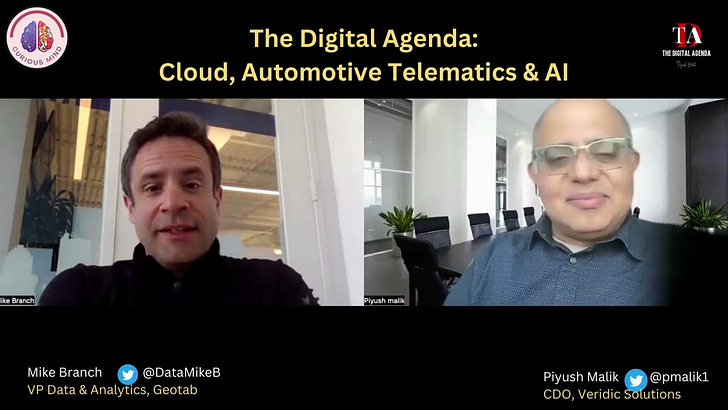





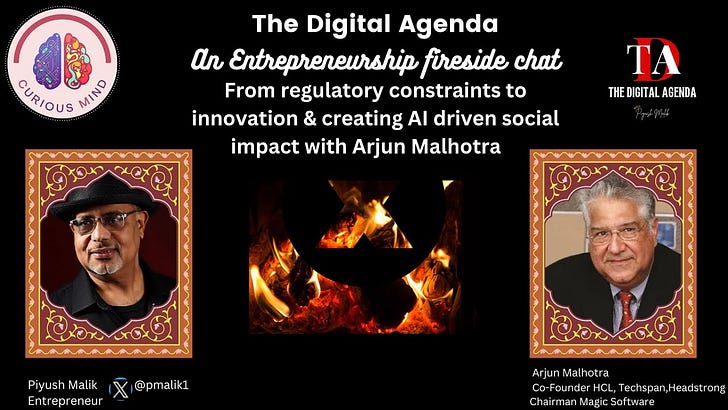
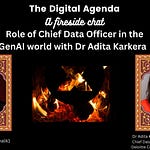
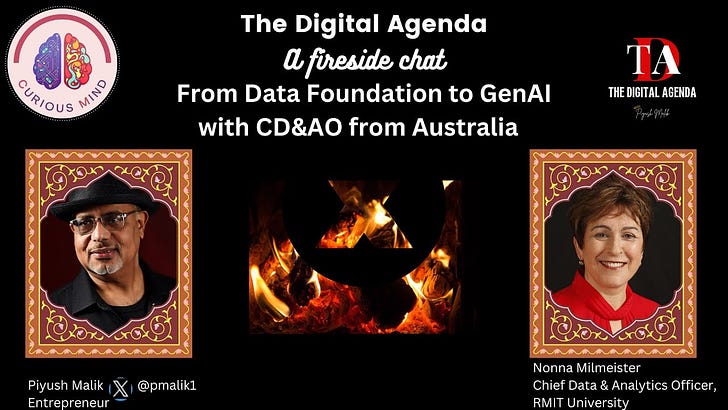
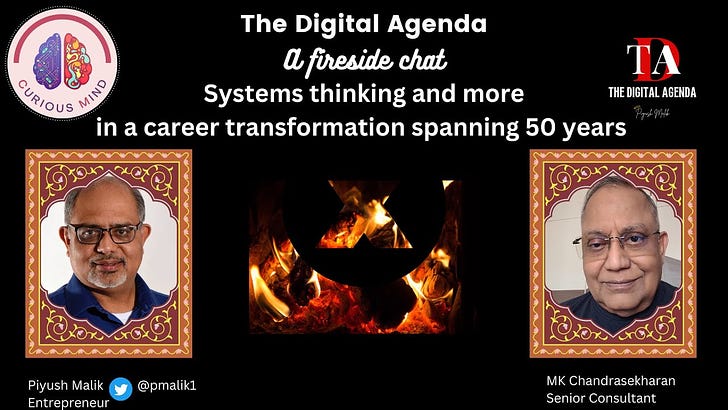
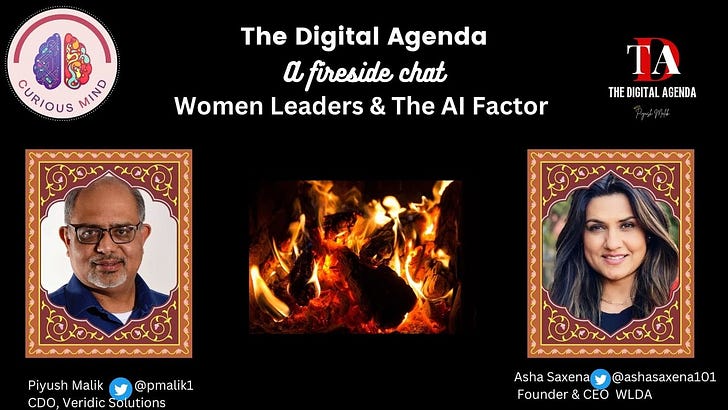
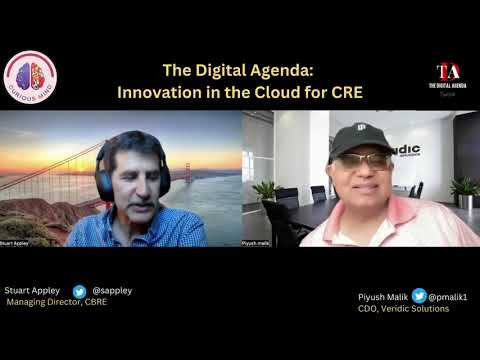
Share this post